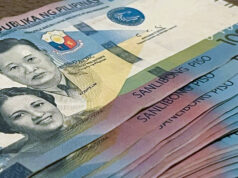House gets DoF proposal to cut corporate tax
THE ADMINISTRATION of President Rodrigo R. Duterte submitted to the House of Representatives on Monday the second of up to five planned tax reform packages — seeking to cut the corporate income tax rate and remove fiscal perks of sectors that do not need them — as lawmakers returned from a month-long Christmas-New Year break, the Finance department announced on Tuesday.
“The Department of Finance (DoF) has formally submitted to the House of Representatives this week the second package of the Duterte administration’s Comprehensive Tax Reform Program that aims to reduce corporate income tax rates and modernize fiscal incentives to investors… as committed… by Secretary Carlos (G.) Dominguez III last year,” the DoF said in a press statement.
The Constitution requires tax laws to emanate from the House, although the Senate can hold parallel public hearings without formally approving such measures until after the House does so.
That was the case of the first package which the DoF submitted to both chambers in September 2016 and which was enacted as Republic Act No. 10963, or the Tax Reform for Acceleration and Inclusion, on Dec. 19 last year. Slashing personal income tax rates as well as simplifying donor’s and estate tax systems, while plugging projected foregone revenues by either hiking or adding taxes on fuel, cars, minerals, tobacco, some investment products and sugar-sweetened drinks among others, will yield estimated net collections of P89.9 billion in the first year of the law’s implementation.
Yesterday’s press release quoted Finance Undersecretary Karl Kendrick T. Chua as saying that the just-submitted second package, which DoF designed to be “revenue-neutral,” seeks to gradually cut the corporate income tax rate to 25% from 30% currently and to modernize fiscal incentives for businesses by making them “performance-based, targeted, time-bound and transparent.”
The DoF estimates that redundant investor perks have been costing the government more than P301 billion a year in terms of foregone revenues.
“… [I]n general, we are giving up almost 0.8% of GDP (gross domestic product) so far… from these income tax holidays and custom duty exemptions. Together with the VAT, it is P301 billion, or two percent of GDP,” Mr. Chua said, clarifying that “[t]hese are only the investment incentives” and “do not yet include exemptions from the payment of local business taxes and the estimates on tax leakages.”
Citing 2015 data, Mr. Chua said income tax holidays, special rates, custom duty and import value added tax (VAT) breaks made up 53.77 billion, 32.48 billion, P18.4 billion and P159.82 billion, respectively, of foregone revenues that year, “almost five percent of national government revenues and 0.78% of GDP.”



